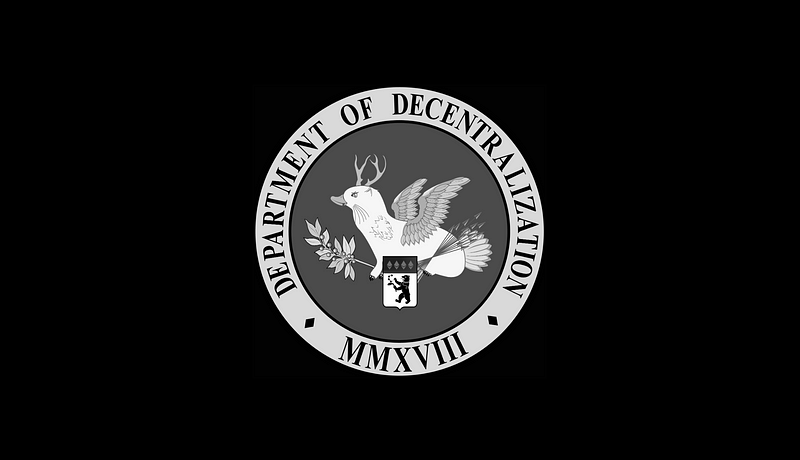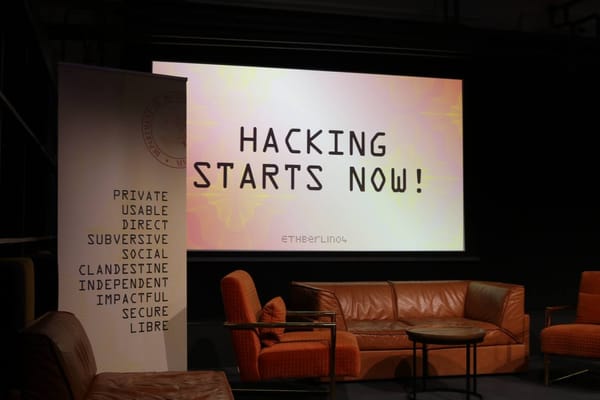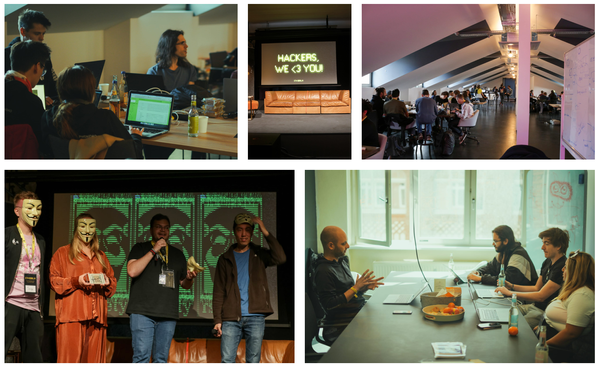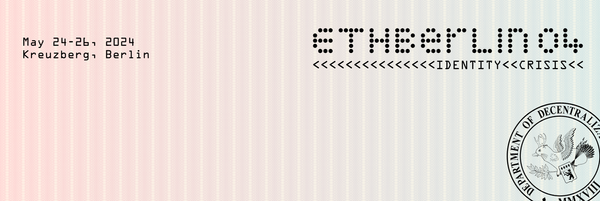The Department of Decentralization: where we’re at, where we’re going, where does ETHBerlinZwei…
When we kicked off the first ETHBerlin we really didn’t know what we were doing. Shortly after, we figured out that we wanted to do way…

The Department of Decentralization: where we’re at, where we’re going, where does ETHBerlinZwei fit in the equation
When we kicked off the first ETHBerlin we really didn’t know what we were doing. Shortly after, we figured out that we wanted to do way more than a hackathon. We wanted to provide a vehicle for people to be aware of decentralised technologies, to look after the humans behind the (virtual) machine, and to have a structure from where to advocate officially for what we believe in: freedom, decentralization and transparency.
This all sounds very unoriginal — we know that 90% of the people in the space think like this. Also, non-profit structures are founded for the same purpose. However, most of them do not only pursue this, but also look for ways to fund multi-million projects. That’s totally fine — we rely on these people to build robust and novel technologies to push the Web 3.0 / Decentralized ecosystem forward.
While these guys work hard in the protocols that will shape humanity in the future — advocacy groups are important. This is what we try to do. However, as we believe in “showing, not telling”, the Department of Decentralization has several projects in our umbrella to look after, build and steward to come into fruition.
So, concretely — what the hell do we do, and what do we want to do? Stick with us through this write-up and you’ll find out.
What DoD is doing or has already done (in a sort of chronological order):
ETHBerlin 2018 — self explanatory — but a recap:
You can read about our values here. Read about the winning projects (wow) here. xDAI, Goerli Testnet and Metacartel were also born there to name a few. Piñata joined the IPFS community officially shortly after, now they’re a full blown startup (don’t miss Matt Ober’s “from Hackathon to startup” talk at ETHBerlinZwei.
NuCypher pulled off probably the most brilliant Hackathon strategy known: they sponsored, they decided to hack, they pulled off Fully Homomorphic Encrypted smart contract, and they won the exact amount they had sponsored for. GAME US. We love it. Also — don’t miss Tux and his talk on FHE at the conference as well.
The Flux guys met up there, now they have an awesome prediction market going on.
If you participated in 2018 and your project is also growing — get in touch. We want to provide you feedback, advice, shill you, or whatever we can do to help. If the event did something for you — also get in touch, we’d love to hear your story, if you wanna tell us about it.
Goerli Testnet:
DoD did not invent the Goerli Testnet, but it’s one of our proudest achievements either way. Why? Because this micro community was born in the first stages of our exploration towards ETHBerlin 2018, and more reasons you will read below.
Helena, Afri and MP flew to ETHBuenosAires to volunteer and mentor. MP was on a mission for the former ECF, and Afri was mentoring, while Helena was helping the BA team with social media. Afri mentioned there was a really special team and we were curious. Then we met David, Aidan and Elizabeth (Chainsafe), they were literally hiding under a staircase hacking away. We asked them what they were doing, and they told us of DeNode, a decentralised Infura… NBD.
The conversations we had with Chainsafe cemented a friendship and a support line — they told us their ideas, we gave advice, and continued to work together. In the end, Chainsafe was awarded a grant for Denode, and of course, the whole team came to hack in Berlin. Afri had written an EIP back then and they wanted to make it a reality. HELLO GOERLI TESTNET.
But… Goerli cares not about boundaries, or rules, or limitations. Overnight, it escalated. When the judging time came upon ETHBerlin, these guys had two projects, the testnet, and the faucet. We said “damn”, judges said “damn”, we also said “why are 9 people on stage when teams should be of tops 4?”, but that’s a minor thing :)
FInally, we had to disqualify Goerli and strip them off their award (which went to the awesome Good Badger project from South Africa). But we took them under our wing.
Afri found funds through ETC — as Ethereum Classic needed a new testnet that was fast and reliable as Goerli/Kotti, MP joined the team and became a manager, and the wider DoD decided to throw the first conference about a testnet EVER — where we launched the testnet to mainnet, or to testnet? Later, EF granted Goerli and we are still growing strong, supporting ETH 2.0, looking after Kotti (ETC’s testnet) and more and more teams have migrated to Goerli, maybe for the fame, maybe because it’s a really awesome testnet :)
Raising awareness for a testnet was a really fun thing to do — and actually so necessary.
Goerli also hosted socials at Cape Town thanks to Franzi and our volunteer Annett, because of course, community matters and needs drinks ;)
The fully operational Goerli was further presented by Afri at ETHCC :)
Now both Goerli and Chainsafe decided to sponsor ETHBerlinZwei — both businesses are going well and even if we keep things separate, we are constantly synergizing. Don’t miss Aidan, Greg, and probably Afri (will you?) at ETHBerlinZwei, speaking of all that’s been achieved on ETH2, Cross-Chain collab, and of course, THE MOST BEAUTIFUL TESTNET IN THE WORLD
The Jobs repo + ramifications:
During the coldest moment of the crypto winter, we decided to take action and create a list of projects recruiting. Our jobs repo was born. We don’t ask you for any fees. We just want people to find their dream job. Submit a PR — this repo has been growing, and will continue to.
During ETHBerlin, we will have a job fair for our sponsors — again, there will be no DoD control over this. No intermediaries mean direct and honest contacts and more jobs.
Education program + Knowledge Base :
We launched this initiative at Görlicon, because of course, when done with a launch, why not just launch another thing!
B9 lab is our partner for the educational arm of DoD, more initiatives will hopefully follow, but we wanted to test the grounds on this, and B9 has the necessary experience and track record. Moreover, Elias, the CEO has been an integral part of ETHBerlin since the start, helping out with mentors.
The program is aimed to train as many developers into Ethereum, certified, as possible. Our capacity is 1000 — and this also depend on sponsoring but there is a bigger pledge. For every seat sponsored (approximately 1000 DAI) — B9 doubles and sponsors a new one.
DoD kickstarted the program by sponsoring 15 seats for 15.000 DAI (in case you wonder where our money goes) — and together with other sponsors, we managed to get to 100 in the first cohort. This first cohort is now fully certified and some of them are even hacking at ETHBerlinZwei.
The second cohort has also launched — and we plan on continuing.
Our next goal is to be able to foster and support more education, not necessarily B9 and continue to raise awareness. Of course, ETHBerlin IS education — we are working with Chris Ward, Ligi and Afri to generate a big knowledge base on all things needed for the Hackathon and beyond, sourcing documentation from the best teams in Ethereum and beyond: libp2p, IPFS, and many more. This knowledge base, after ETHBerlin, will continue growing and become its own project, and will always remain open-source and collaborative.
The Art Collective:
Promoting an interdisciplinary mindset within the blockchain ecosystem is crucial to its success. In general, diversity within an industry or team has been found to produce better results with regard to innovation and development. The Department of Decentralization’s arts and blockchain working group was formed for this purpose, to facilitate cross-sector collaboration between blockchain developers and art community. The DoD’s team combines technical expertise across numerous blockchain-based protocol initiatives together with artists with artists, art collectives and other art professionals specialized in cross-sector expressionism. The common thread between developers and artists is the desire to create works of art that solve problems, express sentiment or ideologies, evoque concepts or change the status quo.
Our first production was a discussion called “There is no such thing as Blockchain Art” at Goerlicon. From there, we drawed conclusions and entered a research phase of 5 months to produce the paper with the same name, referring to the current status of the intersection between Blockchain and Art.
Our next action is the Culture Room, at ETHBerlinZwei, exploring the relationship between mechanic and organic systems. A 360 SQM space featuring artworks, discussions and more. Read the concept here.
ETHBerlinZwei:
This is pretty redundant by now, so due to the very large wall of text that we wrote, here’s ETHBerlinZwei in a nutshell — or better put, what it will be.
ETHBerlinZwei is a hackathon, a cultural festival, an educational event, a platform for hacktivism, and a community initiative to push the decentralized ecosystem forward. ETHBerlin 2018 was a fertile ground where several relevant projects were born — though only one of them was actually a winner: xDai, Görli Testnet, the MetaCartel. Zwei pushes further towards creating an even more fertile ground for new talent to surface.
For Zwei, we’re decentralising the festival processes and features: we take proposals from everyone in the ecosystem to add building blocks to enhance the hackathon, and we make them work. We’re DAOing a part of it, trying to gather as many protocols and chains to make it fully agnostic, and working with the sponsors to create new experiences. Hackers can choose to enjoy the full package, or opt out of features they are not too keen on. We’re basically the libP2P of hackathons.
What to expect:
Anything and everything — see our 2019 manifesto.
Collaboration: we are in joint work with dAppcon Berlin, giving access to all hackers to the conference.
New jobs for hackers. Exciting and ambitious projects, both for the sponsors and for the ecosystem.
Sustainability: the DoD pledges to follow up with all projects stemming from the 2018 and 2019 and help them evolve.
Cultural, educational and inclusive experiences for all, running in parallel with the hackathon.
Commitment: we have created an ecosystem improvement tier — all donations to that go straight into the open track bounty. All tiers contribute additionally to this bounty.
Decentralization: our Continuity Fund gives the power to the people. Read this in the DAOstack post here.
Decentralizing the Department of Decentralization:
Truth be told, we are currently quite democratic but quite centralized. Efforts are carried out by 20 or so people.
Once we are done with the Hackathon, with the help of Colony, we will decentralise DoD’s operations in favor of a DAO, and set the foundation for people wanting to create their own DoD arm.
As we just finished registering everything in Germany, and we are an official non-profit grassroots organization, this has been a bit side-tracked. But we’re on it. For the moment, I, MP am serving as the Managing Director by German law.
However, our organisation is not relying on my work or decision-making power alone.
We are (in no particular order): Mareen, Raul, Helena, Stina, Addy, Mariana, Phillip, Elias, Afri, Ligi, Michelle, Griffin, Franzi, Michael, Alex, Carl, Caspar, Chris, Lasse, Daniel, Simon, Fede, Guto, Lili, MP and many collaborators more.
In conclusion: DoD is not only ETHBerlin, and but ETHBerlin is core (for now) to our success. We work for the entire ecosystem and here are all the proofs of the things we have achieved so far. We still don’t know where we’re heading, but at least we’re up to something good. Consider supporting and joining: joinus@ethberlin.com




